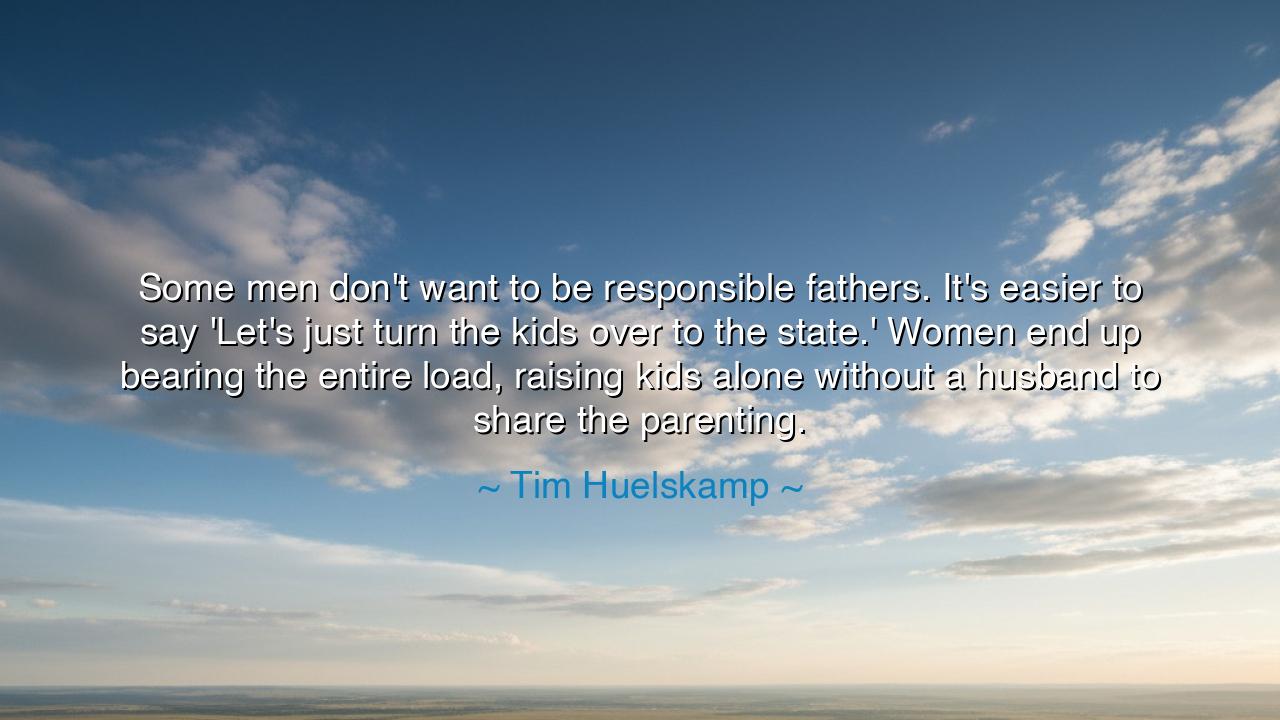
Some men don't want to be responsible fathers. It's easier to
Some men don't want to be responsible fathers. It's easier to say 'Let's just turn the kids over to the state.' Women end up bearing the entire load, raising kids alone without a husband to share the parenting.






Hear the words of Tim Huelskamp, who speaks with stern honesty: “Some men don’t want to be responsible fathers. It’s easier to say, ‘Let’s just turn the kids over to the state.’ Women end up bearing the entire load, raising kids alone without a husband to share the parenting.” In this declaration lies both lament and warning, for it names a wound in the order of the household and in the fabric of society. The abandonment of fatherhood is not merely the absence of a man, but the absence of shared duty, the breaking of a covenant that leaves women burdened and children without the fullness of care.
In the days of the ancients, to be a father was not only to sire a child but to stand as protector, provider, and guide. The household was seen as a sacred unit, where the strength of the man and the nurture of the woman wove together to raise children who could endure life’s storms. Yet, as Huelskamp warns, when men shirk this responsibility, when they cast off the yoke of duty for the ease of abandonment, the weight does not vanish—it falls upon the shoulders of women, who bear it often with tears, yet also with strength not meant to be borne alone.
The phrase “turn the kids over to the state” reflects a modern failing: the surrender of personal responsibility to institutions. While governments and schools may offer aid, they can never replace the daily love and discipline of a father’s presence. The state may house, feed, or educate, but it cannot embrace a child with the love of a parent, nor guide them with the authority of one who shares their blood. To hand over this sacred role is not relief but betrayal, for it leaves children raised by systems instead of souls.
History itself offers warning. In the ruins of Rome, as the empire decayed, fathers became less engaged in the raising of their children. Wealth, indulgence, and distraction led many men to leave the household in the care of slaves, tutors, or institutions. Children grew without the steadying presence of their fathers, and discipline and virtue declined. Historians note that this breakdown of family responsibility weakened the very foundations of Rome, leaving it vulnerable to collapse. So too today: when fathers retreat, societies fracture, and when women are left to bear the entire load, the balance of the home—and the strength of the nation—falters.
And yet, within this lament is also recognition of women’s heroism. Throughout time, mothers abandoned by men have risen in resilience, raising children alone with courage that astonishes the world. They are warriors in the quiet, carrying double burdens with no one to share their watch. But while their strength is great, Huelskamp’s words remind us that this is not the natural or just order. Women should not be left always to bear what was meant for two. Parenting is a shared calling, and to abandon it is to wound both partner and child.
The lesson is clear: responsibility is the foundation of fatherhood. To bring life into the world is to accept the sacred duty of nurturing it. A man who abandons this role may escape the toil, but he also forfeits honor. A true father stands, even when weary, even when afraid, sharing the load with the mother, guiding the child with presence, not absence. His strength is not in the ease of escape but in the endurance of love.
Therefore, let all who hear these words take action: fathers, embrace your responsibility; mothers, honor your labor; children, understand the sacrifice of those who raise you. And let society itself remember: the state cannot raise a child’s heart—it can only fill gaps left by absence. The true work of parenting must be borne in the home, by those who chose to bring life into the world.
Thus Tim Huelskamp’s words echo like a trumpet of warning across generations: when men forsake their role as fathers, women are left to carry the burden, and children lose the fullness of love. But when men and women stand together in shared duty, the family becomes unshakable, and children are raised not by one, nor by the state, but by the strength of two united in love and purpose.






AAdministratorAdministrator
Welcome, honored guests. Please leave a comment, we will respond soon